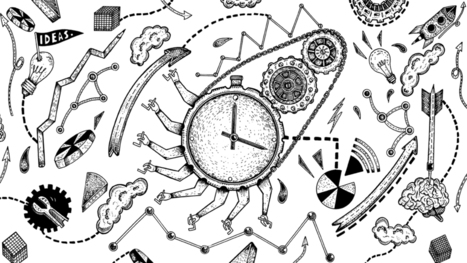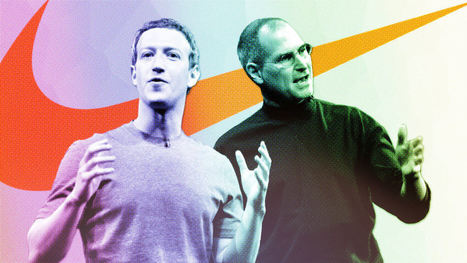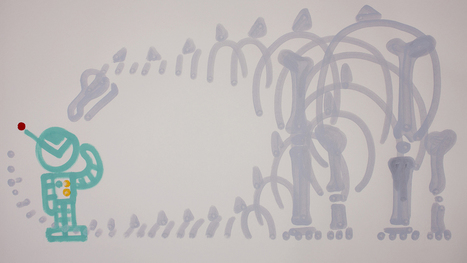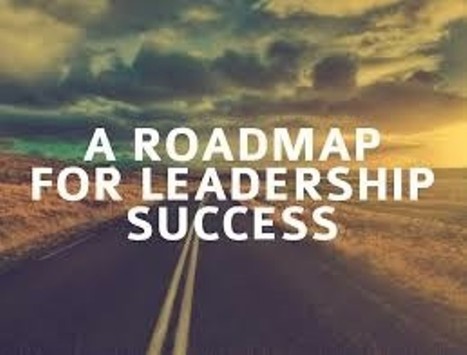 Your new post is loading...
 Your new post is loading...
What are the defining attributes of great leaders? That's the age-old question thought leaders and scholars galore have been attempting to answer in mountains of books and literature. While great leadership, to an extent, can be personal and subjective to the follower, there are universal principles you can't argue with (but you can try). Speaking of those thought leaders and scholars, here are six traits that keep surfacing over and over again in the leadership literature and best-sellers. 1. They challenge their own assumptions. Great leaders may be smart and know a lot, but they are humble enough to recognize there are smarter people in the room that they can learn from. They don't restrict themselves from opinions and input outside of their own. They surround themselves with diverse perspectives to help them answer questions like, "How do I know my decision is the right one?" or "Is there a better course of action here?"
Via The Learning Factor
To make a good decision, you need to have a sense of two things: how different choices change the likelihood of different outcomes and how desirable each of those outcomes is. In other words, as Ajay Agrawal, Joshua Gans, and Avi Goldfarb have written, decision making requires both prediction and judgment. But how do you get better at either? We’ve published volumes on this subject —here are a few of my favorites — but there are three rules that stand out. Following them will improve your ability to predict the effects of your choices and assess their desirability. Rule #1: Be less certain. Nobel-prize-winning psychologist Daniel Kahneman has said that overconfidence is the bias he’d eliminate first if he had a magic wand. It’s ubiquitous, particularly among men, the wealthy, and even experts. Overconfidence is not a universal phenomenon — it depends on factors including culture and personality — but the chances are good that you’re more confident about each step of the decision-making process than you ought to be. So, the first rule of decision making is to just be less certain — about everything. Think choice A will lead to outcome B? It’s probably a bit less likely than you believe. Think outcome B is preferable to outcome C? You’re probably too confident about that as well. Once you accept that you’re overconfident, you can revisit the logic of your decision. What else would you think about if you were less sure that A would cause B, or that B is preferable to C? Have you prepared for a dramatically different outcome than your expected one? You can also practice aligning your level of your confidence to the chance that you’re correct. Try out quizzes like this one or this one. You’ll realize that while it’s not possible to always be right, it’s totally possible to become less overconfident.
Via The Learning Factor
If you’re constantly frazzled on the job, logging super-long hours with little to show for it at the end of the day, chances are good that you’re mismanaging your time. But the good news is it’s easy (enough) to reorganize your schedule and get back on a successful track, stat! “There’s a lot coming at us: mail–and [all kinds of] paper in general–emails, texts, phone calls, bosses calling for help, deadlines, projects–it doesn’t stop,” points out Felice Cohen, organizer and author of 90 Lessons for Living Large in 90 Square Feet (or More). No wonder so many of us get so behind and feel so exasperated. But it doesn’t have to stay that way. The answer isn’t to do more. “Not everyone can multitask, and most of us who do probably shouldn’t,” says Cohen. Rather, the answer is to do what you do smarter. And here’s how.
Via The Learning Factor
One of the most difficult transitions for leaders to make is the shift from doing to leading. As a new manager you can get away with holding on to work. Peers and bosses may even admire your willingness to keep “rolling up your sleeves” to execute tactical assignments. But as your responsibilities become more complex, the difference between an effective leader and a super-sized individual contributor with a leader’s title is painfully evident. In the short term you may have the stamina to get up earlier, stay later, and out-work the demands you face. But the inverse equation of shrinking resources and increasing demands will eventually catch up to you, and at that point how you involve others sets the ceiling of your leadership impact. The upper limit of what’s possible will increase only with each collaborator you empower to contribute their best work to your shared priorities. Likewise, your power decreases with every initiative you unnecessarily hold on to.
Via The Learning Factor
Being more productive is about working smarter, not harder, and making the most of each day. While this is no easy feat, getting more done in less time is a much more attainable goal if you’re not sabotaging yourself with bad habits. Following are 16 things you should stop doing right now to become more productive.
Via The Learning Factor
Possibly no piece of productivity advice is more well-worn than the adage, “Work smarter, not harder.” Of course, the directive points to the fact that it’s not how many hours you put in at your desk that matters—it’s how you spend your time there. In other words, get results faster and you won’t be spending so many late nights at the office. But what does it really mean to work smarter? “It means figuring out better, faster ways to work,” says personal productivity expert and trainer Peggy Duncan. But before you enrol in a time management course or start playing “beat the clock” with your project list, consider these counterintuitive ways to get more done.
Via The Learning Factor
To effectively lead and motivate employees, you don’t need charisma and a grand vision. Research from Michigan State University (MSU) found that being a successful boss was more about mind over matter. The study, published in the journal Organizational Behavior and Human Decision Processes, found that a leader’s focus, or mind-set, affects his or her own behavior, which in turn affects employees’ motivation. And the good news is that your mind-set can be changed to produce certain outcomes from workers, from creativity to loss prevention. “Effective leadership may be based in part on a leader’s ability to recognize when a particular mental state is needed in their employees and to adapt their own mental state and their behaviors to elicit that mind-set,” says Brent Scott, MSU professor of management and study coauthor. “Part of the story here is that you don’t have to be Steve Jobs to be an effective leader. There is no one-size-fits-all approach to managing.”
Via The Learning Factor
ow can leaders help employees find meaning at work? Organizations spend considerable resources on corporate values and mission statements, but even the most inspiring of these — from Volvo’s commitment to safety to Facebook’s desire to connect people — tend to fade into the background during the daily bustle of the work day. What workers really need, to feel engaged in and satisfied by their jobs, is an inner sense of purpose. As Deloitte found in a 2016 study, people feel loyal to companies that support their own career and life ambitions — in other words, what’s meaningful to them. And, although that research focused on millennials, in the decade I’ve spent coaching seasoned executives, I’ve found that it’s a common attitude across generations. No matter one’s level, industry or career, we all need to find a personal sense of meaning in what we do.
Via The Learning Factor
First-time managers often ask themselves how to develop a leadership style that suits them: “Who should I model myself after? What kind of leader should I be?” It’s great to think critically about your approach to managing others, particularly when you’re new to it, but these questions won’t exactly help you. That’s because they assume that leadership is something you try on and show off, a “style” that’s curated and intentional. But especially in the beginning, your style will be based far less on mirroring others’ habits and behaviors and far more on instinct and intuition. And that’s not necessarily a bad thing.
Via The Learning Factor
Many workplaces today are in the unprecedented position of having five generations working together, side-by-side. While the exact definition of each generation may vary slightly, any office or workplace today could include members from the traditionalists (born 1927-1945), baby boomers (1946-1964), Generation X (1965-1980), millennials/Generation Y (1981-1996) and Generation Z (those born in 1997 or later). While most would agree that generalizations like generational buckets are helpful only to a point, multigenerational workforces challenge employers to meet a broad range of needs and expectations. Making the matter more complicated: Typical full-time and part-time positions are now being augmented with gig economy roles such as freelance, contract and temporary employment options.
Via The Learning Factor
Packing your beach bags? Firing up a grill? Now’s the time for leaving work concerns at work and skipping off someplace where you can relax, regenerate, let loose, and just have fun. The idea of doing anything that even remotely reminds you of your job probably doesn’t seem too appealing—and that’s fine. But even so, your vacation doesn’t have to be dead time when it comes to self-improvement. Before you roll your eyes and click or swipe out, there’s good news: You can boost your skills while relaxing and de-stressing. In other words, your vacation can be a great time to improve your emotional intelligence—and still thoroughly remain in vacation mode. Since that’s one of the most important job skills on the market right now, it’s worth taking a page or two from the most emotionally intelligent vacationers’ play books.
Via The Learning Factor
A few weeks ago, after receiving a 21-page PDF report breaking down my so-called “emotional intelligence,” I did the logical thing and forwarded it to my boyfriend. He glanced at the list of categories on the second page and exclaimed—before reading my results—”Flexibility, uh oh!” The report was the result of an assessment I’d taken three weeks prior called the EQ-i 2.0, which is based on nearly 20 years of research and has been taken by some 2 million people—and sure enough, it told me I’m about as inflexible as people close to me seem to think I am. Shortly afterward I scheduled a call with its developer, Steven J. Stein, who reviewed my results and offered this suggestion: “I would start looking at how you operate—what your routines are, how you get through a day.” When I asked him for an example of a routine I might want to shake up, he said, “Like, eat a different breakfast or something.”
Via The Learning Factor
I can admit it now; I was completely clueless about a lot of things in my first job out of college. From navigating complicated office hierarchies to knowing exactly what to wear in the workplace, and just exactly how I was supposed to figure things out myself when I had no idea what I was doing. It took me a while to understand the etiquette and unspoken rules of the workplace that now seem so obvious. Of course, I learned with time and would probably not trade my then-naivety for anything else. It did, after all, force me to learn lessons that are so drilled in my head now as a working person. If it wasn’t for my cringeworthy expectation that I was always going to be given clear instructions and then realizing I was wrong, my brain wouldn’t be set to the “automatically anticipate needs” mode that it’s on today. If it wasn’t for me being completely unhappy (and useless) in my first job, I might not have been brave enough to take the plunge and pursue the career that I really wanted.
Via The Learning Factor
|
Mazin Gilbert has an ambitious goal. As vice president of advanced technologies at AT&T, Gilbert wants to make AI technologies widely available throughout the corporation, especially to those who might not have a computer science background and may not even know how to program. Call it the “democratization of AI.” To accomplish that goal, AT&T is building a user-friendly platform with point-and-click tools that will enable employees — up to one-quarter of the company’s workforce — to build their own AI applications. AT&T and a host of other companies are trying to address a crucial issue in business: the severe shortage of AI talent. According to some estimates, only about 10,000 programmers in the world have the necessary expertise to develop advanced AI algorithms. But that’s barely a drop in the bucket for what companies will need in their future workforces. Tools like AT&T’s platform will help spread AI technologies well beyond just a limited number of “haves” and reach the “have nots” that may lack the technical knowledge and experience. This democratization of AI will happen in two ways. First, it will enable employees across a large organization like AT&T to develop their own AI applications to make them better at their jobs. But it will also allow smaller firms to deploy some of the same AI capabilities that have heretofore been limited to large corporations. Think of how spreadsheets like Lotus 1-2-3 and Excel helped democratize data analysis, enabling even mom-and-pop shops to perform invaluable “what-if” analyses.
Via The Learning Factor
Here’s a grim stat: More than half of your staff is ready to leave the company, finds a recent Gallup poll. Vacancies impact the productivity and bottom line of your company, but a survey from Globoforce’s Work Human Research Institute uncovered a reason people stick around. When asked the question, “What makes you stay at your company?” the number-one answer, representing 32% of respondents, was, “My job–I find the work meaningful.” “Having a personal sense of meaning in one’s work was even more important than compensation, which ranked as the third most important reason for staying,” says Eric Mosley, CEO of Globoforce, a talent engagement software provider. The trick is that meaning means different things to different people, says Becky Frankiewicz, president of the staffing and talent management provider ManpowerGroup North America. “Our NextGen Work research found that Boomers value being appreciated and recognized, younger people look for purposeful work that contributes to society, while people of all generations desire work that allows them to improve their skills and balance work and home,” she says. “Taking the time to find out what motivates your people individually is the first step to helping them find meaning in what they do.”
Via The Learning Factor
Let’s not waste any time. The simple solution that we’re all looking for: It doesn’t exist. Want your business to thrive like Amazon’s? Want to emulate Steve Jobs or Mark Zuckerberg? Follow the road map of Nike or Warby Parker to build the next brand that matters? Sorry, it doesn’t work that way. What succeeded for them may not work for you. Too bad. Get over it. One-size-fits-all strategies just aren’t effective in today’s age of flux (and maybe they never were). That’s one of the insightful messages in senior writer Austin Carr’s feature The Future of Retail in the Age of Amazon. It’s become common practice to refer to billion-dollar startups as “unicorns,” but there is no more one-of-a-kind business than Amazon: hard-driving, customer-focused, yet broadly directed, from books and groceries to entertainment, consumer electronics, and web services. Carr explains that competing with Amazon today–trying to beat it at its own game–is largely a fool’s errand. Instead, what increasingly defines retail success, and points the way toward the businesses of tomorrow, is a bespoke model, one that is crafted to deliver on a focused need, proposition, or brand essence.
Via The Learning Factor
When you’re pitching investors, you need a great product and a great story–that much is a given. But those aren’t the only things venture capitalists are looking for. Just as emotional intelligence (EQ, or EI) has steadily crept to the fore in hiring, it’s also “a critical part in the process that we go through when deciding whether or not to invest in a company,” says Janet Bannister, general partner at Real Ventures. As Bannister sees it, “A leader with strong EQ can hire people to complement their skill set and cover for areas where they are weak. However, someone low in EQ will never be able to attract, retain, and motivate high performers–and therefore will have huge difficulties in scaling a company.” She isn’t the only VC who’s thinking this way about sizing up founders’ emotional intelligence. Here are a few key questions that seven other investors like Bannister typically ask to assess entrepreneurs who pitch them for funding.
Via The Learning Factor
Defined hierarchy. Commanding leadership. These corporate ligaments secure firms in the face of threats and unify them against competition. Few beliefs are more widely held in business. The intuition, though, is wrong. “When you look at real organizations, having a clear hierarchy within your firm actually makes people turn on each other when they face an outside threat,” says Lindred Greer, a professor of organizational behavior at Stanford Graduate School of Business. Effective teamwork against threats requires not hierarchy, but egalitarianism; not centralized power, but a culture in which all voices count. Along with Lisanne van Bunderen of the University of Amsterdam and Daan Van Knippenberg of Drexel University, the research team teased out this finding through two complementary studies. In the first study, an experiment, teams of three students developed and pitched a consultancy project to a prospective client. Some of these teams were non-hierarchical, while members of other teams arbitrarily received titles: senior consultant, consultant, junior consultant. Likewise, some teams faced no rivals, while others were told they were competing with a rival firm for clients. The researchers found that the subset of hierarchical teams facing competition with rival firms struggled with infighting while the egalitarian teams cooperated on their work.
Via The Learning Factor
As entrepreneurs, we often work late into the night, only to roll out of bed the next morning, picking up where we left off. One day bleeds into the next, making it seem as if we're always doing, doing, doing and searching for new and novel ways to do more. The truth is, your desire to do more and get more done will lead you not toward greater productivity, but toward burnout, if you don't take time each day to check in with yourself, and set your intention for how you want your day to proceed. Abraham Lincoln is credited with saying, "If I had six hours to cut down a tree, I'd spend the first four sharpening the axe." There is no evidence to suggest that Lincoln actually said this, but the point is not lost on us. How we prepare to do the task before us determines our success.
Via The Learning Factor
Millennials are starting to take control in the workplace. There are now more than 75 million millennials in the workforce, more than baby boomers (just shy of 75 million) and Gen Xers (66 million). Now entering their late 20s and early 30s, the oldest members of the generation are starting to take more leadership positions in major organizations. Despite the fact that millennials are sporting one of the lowest rates of entrepreneurship in 25 years, 60% see themselves as entrepreneurs, and 90% recognize entrepreneurship as a mindset. Combined with their natural tendencies toward independent thought and mild to moderate anti-establishment vibes, this is making millennials a strong force of direction and leadership—and an even stronger one to come in the next several years.
Via The Learning Factor
Although organizations spend more than $24 billion annually on leadership development, many leaders who have attended leadership programs struggle to implement what they’ve learned. It’s not because the programs are bad but because leadership is best learned from experience. Still, simply being an experienced leader doesn’t elevate a person’s skills. Like most of us, leaders often go through their experiences somewhat mindlessly, accomplishing tasks but learning little about themselves and their impact. Our research on leadership development shows that leaders who are in learning mode develop stronger leadership skills than their peers. Building on Susan Ashford and Scott DeRue’s mindful engagement experiential learning cycle, we found that leaders who exhibit a growth mindset diligently work through each of the following three phases of the experiential learning cycle.
Via The Learning Factor
You don’t need to be told why it matters to be transparent and honest at work–that much is a given. So is the overall usefulness of expressing yourself clearly, confidently, and with as few filler words as possible. But in the effort to do that, many of us fall back on common expressions that might sound totally fine in social situations but can do some quiet damage in the workplace. One of them is “I’m sorry.” Another is “to be honest.” The latter turn of phrase–and versions of it, like “honestly,” “frankly,” “if I can be honest with you,” or “let me be frank”–is easy to resort to when you want to cut through the crap, come clean, or offer your unvarnished opinion. But these expressions also tend to attach themselves to–and subtly encourage–certain messages that are either better left unsaid or ought to be rephrased. Here are times when “to be honest” can make you sound less authoritative around the office.
Via The Learning Factor
It’s hard to get anything done with all of the push notifications pulling us into other directions. You can find something else to do or think about at any given moment. But maybe the distractions aren’t the problem. Maybe it’s your willingness to be distracted that needs to be examined. “Distractions are by-products of a problem,” says Kyle Cease, author of I Hope I Screw This Up: How Falling In Love With Your Fears Can Change the World. “Something outside of you is pulling you away from yourself or a goal. But the distraction is actually on the inside, and what’s going on outside matches what’s going on inside.” We invite distractions as a way to handle three internal struggles, says Cease.
Via The Learning Factor
Do you remember that executive who was such a natural? She never seemed stressed, always knew the right thing to say, delivered good results consistently. A born leader, right? Just had the right genes for leadership from the start. Remember that other boss you had? He was rubbish. Not much point trying to fix him. He just wasn’t a leader. That’s how it looked. But it wasn’t true. My company’s research from multiple fields, as diverse as neuroplasticity (the ability of the brain to form and reorganise synaptic connections, especially in response to learning experience or following injury) and musicology, shows that skills are not as innate as we naturally believe. And that applies to leadership just as much as any other capability.
Via The Learning Factor
If you think your boss is some freak of nature and you're the luckiest person alive, I'll break it to you gently: He or she is human and will make mistakes. The great ones rise up from their errors by A) acknowledging they made a mistake and correcting a behavior (think humility), or B) acknowledging a blind spot that needs to be addressed, then doing something about it. Lets dive into a few prevalent leadership mistakes that even the best and smartest leaders tend to make.
Via The Learning Factor
|



 Your new post is loading...
Your new post is loading...














































Interviewing Manager Candidates is without a doubt the most important job any high level executive can do.
How can you determine if someone truly has stellar leadership capabilities, and the skills needed to take your company to the next level?
Thanks to human behavior analysts, we have some solid indicators that if you pay attention, can give you some insights into a candidates strengths, and weakness.
Can you guess which 6 signs indicate a persons leadership abilities?
Great leaders may be smart and know a lot, but they are humble enough to recognize there are smarter people in the room that they can learn from. They don't restrict themselves from opinions and input outside of their own. They surround themselves with diverse perspectives to help them answer questions like, "How do I know my decision is the right one?" or "Is there a better course of action here?"